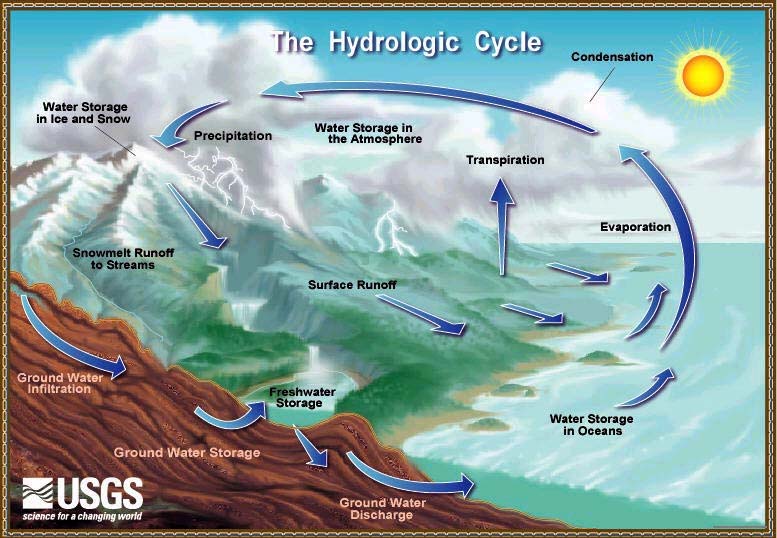Climate Change Water Resources
by Nancy Hearn, CNC
Note: As an Amazon Associate I earn from qualifying purchases.
Climate change and water resources are closely linked. Climate scientists have been saying for years that one of the most critical effects of climate change has to do with what it is doing to the water cycle.
Climate change is having (and will continue to have) an impact on all types of water resources, including freshwater supplies as well as food and energy production.
The Water Cycle Is Affected
Water on earth is always moving through a complex process known as the water cycle, or hydrologic cycle.
According to climate scientists, global warming is having a considerable effect on the water cycle, changing the quality, distribution and amount of available water.
This effect includes everyone who depends on water for all types of water usage in homes, communities, industries, and ecosystems.
Drought and Deluge
One of the known effects of global warming is the increased change in droughts and heavy precipitation.
With higher average temperatures and warmer air, scientists are expecting longer periods of drought interspersed with shorter and more intense bursts of heavy rain and flooding.
I don’t know about other parts of the country, but that is definitely the norm where I live in Arizona.
As much as I love to see it rain, there is no such thing here as a gentle rain. The monsoon rains often lead to flooding during the summer months, which causes all types of issues.
Overall, many regions of North America are expected to have less snow and more rain. Without the gradual melting of snow pack, these areas will experience lower water levels and greater water stress, which is already happening in the western U.S.
Decline in Water Quality
Increased precipitation and flooding in some regions also leads to increased pollution runoff into our waterways.
This type of water pollution includes increased sedimentation, pathogens, pesticides, herbicides, as well as nitrogen from agriculture. These added pollutants will eventually end up downstream in our lakes and oceans.
The drought and deluge cycle has also increased the number of harmful algal blooms, which have become a greater problem in various rivers, lakes and oceans around the world.
As air temperature rises, water temperatures in streams, lakes and reservoirs also rise. This also leads to lower levels of dissolved oxygen in water, which endangers marine life.
Climate Change Water Resources
The negative impact of climate change on our water resources is significant. I am certainly not a climate scientist, but I can discern the scientific facts from fiction and be a keen observer.
I know that we need to decrease our greenhouse gas emissions to protect our invaluable water sources from the effects of climate change.
References
Union of Concerned Scientists USA; Water and Climate Change
WaterCalculator.org; The Impact of Climate Change on Water Resources; 2019
Further reading . . .
10 Ways to Conserve Water and Reduce Your Water FootprintReturn from Climate Change Water Resources to World Water Scarcity - A Little Help Can Go a Long Way
If you would like to reproduce or republish this article or any other article on this site, feel free to do so but please include a reference or link to the article at WaterBenefitsHealth.com.
Sign Up for Our Monthly
Newsletter
Visitor Comments
"This was the best and most straight forward info on the net yet. I asked a question and got an answer that made sense. Thank you so much!" - Linderlinder
FINALLY!!! I have been wondering about this for years with no 'solid' answer. This is exactly what I've been wanting to know! Thank you for this share..." by Andy
"Thank you for the information, Nancy. I appreciate it. Your article and findings are very helpful, referring to dehydration." - Carolyn
"Lemon water is one drink both my wife and I can't drink. It upsets our stomachs. We are in our sixties and in very good health—well, better health now that we drink about 2 liters plus of water each day. It has made so much difference to our digestive systems and recovery every day. Thank you for your website and effort." - Rod



